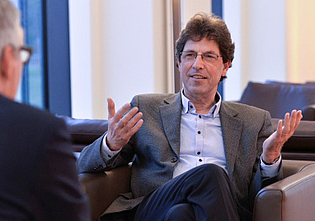Annual Assembly
Time from the Perspective of Physics and Philosophy
In Conversation with Prof. Dr. Thomas Lengauer, Coordinator of the Lectures at the Annual Assembly

Foto: Christoph Rieken for Leopoldina
The topic of the Leopoldina’s Annual Assembly 2019 is “Time in Nature and Culture”. While physicists break time down into ever-smaller units, and biologists analyse the timekeeping functions in our brains, the concept of time is still a mystery for philosophers. The mathematician
and computer scientist Prof. Dr. Thomas Lengauer ML, Member of the Presidium of the National Academy of Sciences, planned the event.
How did you come up with the idea to put time at the heart of the Annual Assembly?
Thomas Lengauer: I can’t take any credit for the idea. We always ask the members of the Leopoldina for suggestions, and this idea was proposed by three members of the Anatomy Section: Prof. Dr. Horst Werner Korf, Prof. Dr. Elmar Peschke and Prof. Dr. Bernd Herrmann. The initial focus was specifically on chronobiology and chronomedicine. But the topic of time has fascinated me since I was a child, and I was inspired to present the Presidium with my ideas for all the things we could do on the subject. In response, I was asked to coordinate the event.
Where did your fascination with time come from?
It began with a formative experience when I was ten years old. I had just had an operation and was lying in the hospital feeling homesick. And suddenly I realised that this moment in time, although it wasn’t a pleasant one, was entirely unique – it would never return. This feeling of travelling along a timeline, the irretrievable nature of the past and the unknowability of the future, it’s simply a mystery. I’ve been interested in time ever since.
What would be your response if someone said to you: We’re facing so many urgent challenges like digitalisation, migration, climate change, and scholars are thinking about such a timeless issue – if you’ll pardon the pun – as the concept of time?
The Academy is doing plenty to face up to current issues – our statement on air pollution in April and our
recommendation for a new reproductive medicine law in June are just two examples. But, an academy of sciences is also there to address these timeless, fundamental questions, and putting them at the centre of a conference honours the Academy and underlines its character.
Philosophers ponder the concept of time, while physicists work with attoseconds. Do the two camps have something to say to one another or are the individual programme items completely separate?
Well, Norman Sieroka, who’s coming to the Annual Assembly, is not just a philosopher but also has a doctorate in natural sciences, and he will be drawing plenty of links to the talks about cosmology, the arrow of time and our perception of time. There’s the linear model of time, of course, which we’ve lived by ever since we started measuring time, and there’s the circular, periodic model, which was the way people felt before they had any concept of progress. Two different ways of looking at time which are both underpinned
by physics and which philosophers can put in perspective.
When you’re choosing speakers for the assembly, do you start by looking through the Leopoldina’s list of members?
No, not at all. We do draw on the knowledge and connections of our active members. But we also find some of our speakers by looking through literature and online.
How easy is it to attract international speakers?
When I approach people abroad and say that I’m from the Leopoldina, they do sometimes ask what that is.
And that’s when it really comes in useful to have members who can use their personal connections to convince people. At that point, giving a talk partly comes down to doing a favour for their friends.
What’s a successful Annual Assembly for you?
I’m pleased that there will be a lot of people who aren’t long-standing Leopoldina members. We always have 50 school pupils there who are selected in advance. We’ll also be publicising the event, and I hope that it attracts interest from beyond the scientific bubble.
